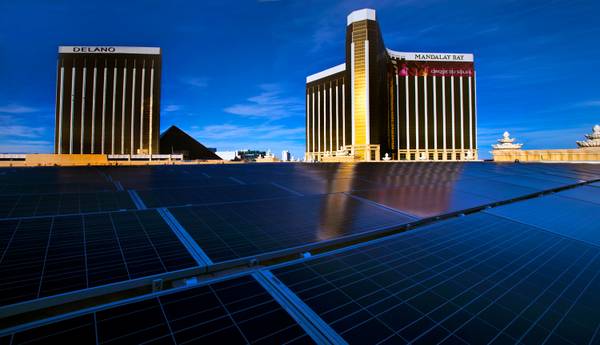MGM Resorts International filed an application with the Public Utilities Commission on Thursday to purchase power without the state’s dominant utility, NV Energy.
MGM’s application follows the filings this month of Wynn Resorts and Las Vegas Sands, highlighting an attempt at mass departure by the state’s influential companies and sparking a debate about consumer choice and protecting ratepayers from higher power bills. Caesars is expected to submit an application in the coming days. Las Vegas-based Switch, the world's largest data center, is nearing the end of its seven-month application process.
MGM pervades the Las Vegas Strip with more than a dozen properties and is one of the utility’s largest customers, consuming around 5 percent of NV Energy’s load. The company wants to purchase 174 megawatts independent of NV Energy but will still purchase some power from the utility, according to the company’s PUC filing. The company’s application says it will use an NV Energy substation to transmit the energy and will compensate the utility for the use of its distribution system.
The filing says MGM wants to purchase power from Tenaska Power Services, a company that supplies at least 20,000 megawatts of power across the country (the equivalent to about 25,000 Super Walmarts). The company wants to commence the new agreement by Feb. 1, 2016.
The PUC will vet the application and will likely deliver a ruling before the end of the year.
The casinos are eligible to leave the utility because of a 2001 law that lets companies leave if they consume more than 1 megawatt of energy per year, pay an exit fee and receive PUC approval.
The law was an effort to provide large-scale power consumers with more options for buying and creating power. Lawmakers passed it during the California energy crisis spurred by Enron, the defunct energy company that manipulated power markets in Western states to improperly control the price and availability of electricity.
In the Switch case, those fees have been the subject of intense debate about protecting ratepayers. That will likely repeat with the casinos. The companies, PUC and NV Energy all propose what they describe as a fair exit fee. The PUC’s three independent commissioners ultimately approve the final number.
“MGM believes that its exit from the [NV Energy] system will not be contrary to public interest, or otherwise place undue burdens on remaining utility ratepayers,” the MGM application, written by company attorneys, said.
This is not MGM’s first attempt to take advantage of the law. The company tried in 2002 but decided against it after PUC vetting.


Join the Discussion:
Check this out for a full explanation of our conversion to the LiveFyre commenting system and instructions on how to sign up for an account.
Full comments policy